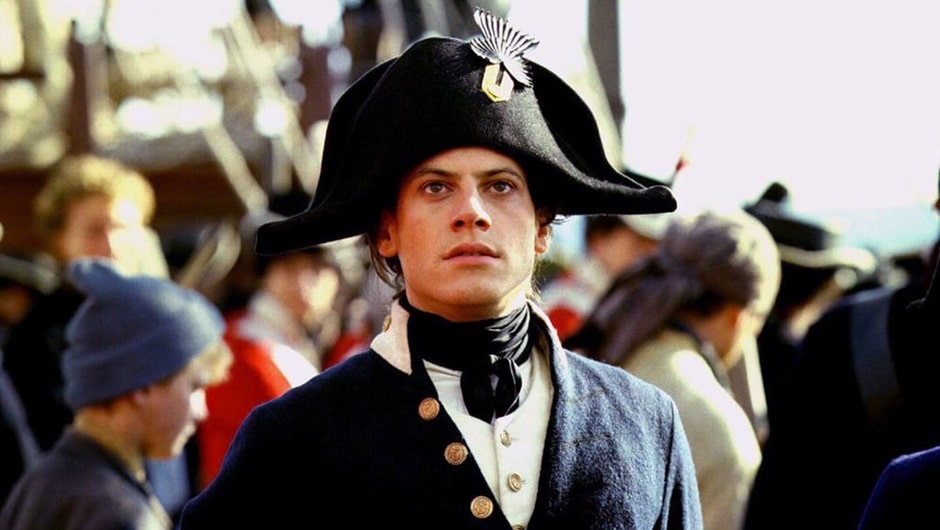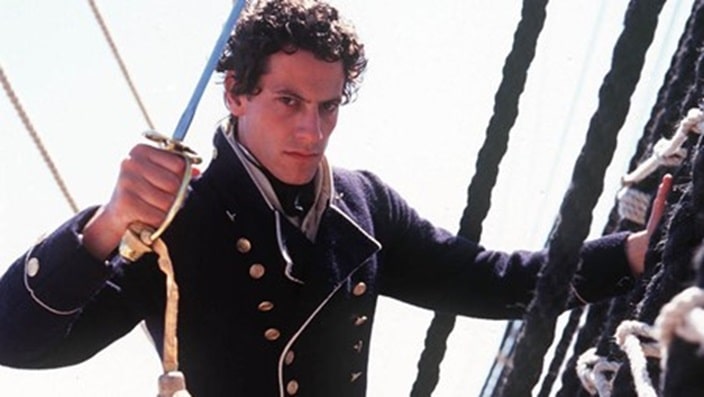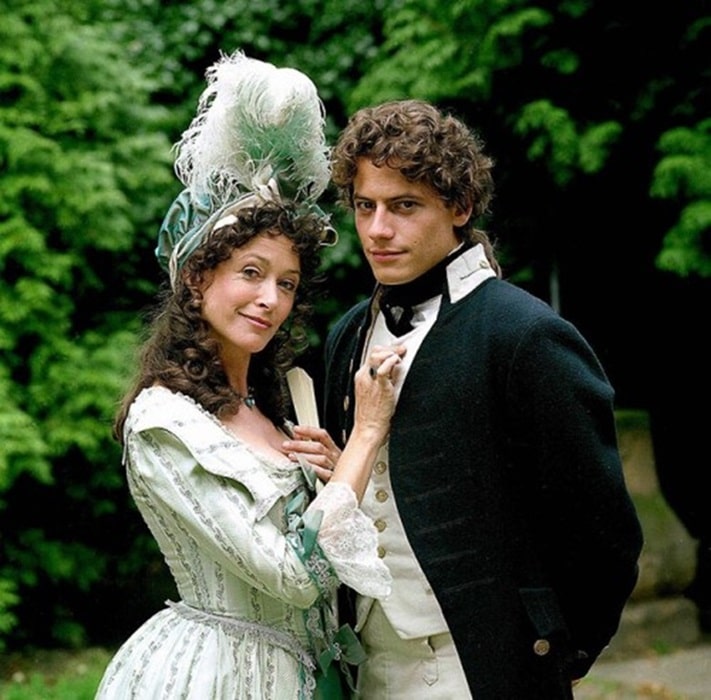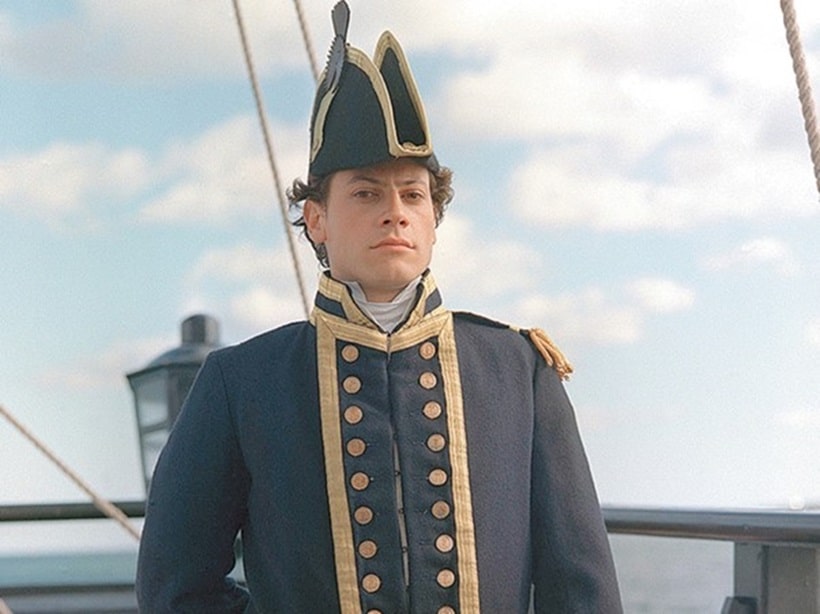Ellsworth’s Cinema of Swords: Young Horatio Hornblower
Hornblower 1: The Duel (UK, 1998)
When you think about swashbucklers at sea, two time periods come to mind: that of the pirates and privateers, from the 16th through 18th centuries, and the Napoleonic naval era at the beginning of the 19th. British captains and crew figure prominently in both these milieus, as you’d expect from an island nation that depended on sea trade and effective warfare on the waves.
The British, of course, are proud of their naval heritage, so in the late ‘90s, when the ITV Network set out to make a series of television adaptations of C.S. Forester’s classic Hornblower novels, somehow enough money was found to shoot film adaptations with production values rarely seen on TV before Game of Thrones. The films, well-cast and well-written, were popular enough, though the size of the productions meant that only one or two could be produced per year. And fortunately for us, they still hold up, by and large (that’s nautical lingo!), a quarter-century later.
Hornblower 1: The Duel (or The Even Chance)
Rating: ****
Origin: UK, 1998
Director: Andrew Grieve
Source: A&E DVD
These TV movies, made for the British ITV network, are based on the Hornblower series by English author C.S. Forester; this film adapts and combines several stories from the first collection, Mr. Midshipman Hornblower. ITV had done well with the Sharpe series, and when the first run of that ended in 1997, the network decided to follow up with another Napoleonic swashbuckler, but set in the navy rather than the army. This required an even larger budget than Sharpe, and episodes, including this first one, were shot using a mix of actual sailing ships, sets showing partial decks and sides, and large miniature vessels, some over 20 feet long. On the whole, the mix was effective and persuasive.
The stories follow the early career of a young naval officer, Horatio Hornblower (Ioan Gruffudd), opening with his first posting as a 17-year-old midshipman to Justinian, a ship of the line languishing in port at Spithead in 1793 because the French, just completing their revolution, haven’t yet decided to declare war on Great Britain. Hornblower’s first challenge is surviving the near-lethal bullying of an older officer, Midshipman Simpson (Dorian Healy), who has failed to pass the test for lieutenant and vindictively takes it out on his younger fellows.
Hornblower’s conflict with Simpson provides the film’s main spine, as well as the pretext for the titular duel, bookending a plot that veers off in the middle on a couple of major diversions. This structure is understandable, considering the tale is cobbled together from three separate short stories, but it does make it rather episodic and weak on the point of plot coherence.
Still, The Duel never fails to hold your attention, largely because screenwriter Russell Lewis is wise enough to focus on the real strength of the source material, which depicts a shy and diffident youth becoming aware of his abilities and growing into a confident, capable, and courageous young man. It helps that there’s a lot of action in the final third of the film, after the war starts and Hornblower, who’s been transferred to a fighting frigate commanded by the stern but wise Captain Pellew (Robert Lindsay), takes part in a “cutting-out” night raid to steal a French frigate right out of the port where it’s anchored. When the other British officers on the raid are slain, young Hornblower unexpectedly finds himself in command, but he rises to the occasion and acquits himself well. However, this pits him once again against the cruel and murderous Simpson, a conflict resolved at last in the story’s conclusion.
It is, on the whole, a strong start to an excellent series. Gruffudd is both inspiring and affecting as the young Hornblower, and Lindsay is adorably crusty as Captain Pellew. There’s some fairly realistic cutlass work in the swordplay during the boarding actions, and the ship-to-ship combat only occasionally fails to convince. If you have a taste for naval warfare in the Age of Sail, you won’t want to miss this.
Hornblower 2: The Fire Ship (or The Examination for Lieutenant)
Rating: ***
Origin: UK, 1998
Director: Andrew Grieve
Source: A&E DVD
This series is earnest, it’s serious about the stories it’s telling, and can be admired for that, but it’s also only intermittently fun, with humor that’s wry at best. But we get the point: life in the Royal Navy during the Napoleonic Wars was grim and full of hardship. Hornblower’s themes, drawn straight from the C.S. Forester source material, are always courage and integrity, which (minus the fun) are what swashbucklers are all about.
The Fire Ship picks up where the previous film left off, with Horatio Hornblower (Ioan Gruffudd) still on the frigate Indefatigable under the command of Captain Pellew (Robert Lindsay), who has promoted Hornblower to acting lieutenant while encouraging him to study for the exam that will make his permanent promotion to lieutenant a reality. But there are obstacles to this ambition, including dealing with an outbreak of plague at a diplomatic stop in North Africa, which make study nearly impossible, as well as several unpleasant encounters with the abrasive Captain “Dreadnought” Foster (Denis Lawson), a fire-eater who will be on the senior officers’ board conducting Hornblower’s examination. Uh-oh.
If this entry in the series is less effective than the previous, it’s largely because of pacing problems in its middle hour, when forward momentum often sags. As before, this is partly due to the structural problem of stitching together two disparate stories from the book Mr. Midshipman Hornblower, though screenwriter Mike Cullen does attempt to give the two tales a connection by adding a subplot about an unhappy seaman in Hornblower’s crew who seems bound on self-destruction. But as antagonists, neither this doomed tar nor “Dreadnought” Foster are as interesting as the cruel Midshipman Foster in The Duel, and the story lacks urgency.
The pace finally picks up in the final twenty minutes when the eponymous fire ship, a Spanish infernal machine, appears out of the night to threaten the Gibraltar fleet. Hornblower and Foster must join forces to save the day, and the film ends on an exciting up-note. There’s no denying that the ship action looks great, and that plus Gruffudd’s reliable charisma is enough to persuade one to carry on to the next installment.
Hornblower 3: The Duchess and the Devil
Rating: *****
Origin: UK, 1999
Director: Andrew Grieve
Source: A&E DVD
The Duchess and the Devil is a considerable improvement over the first two entries in the series, in part because the director and cast are hitting their stride, but also because the story is more coherent, having been adapted from the single long, final tale in C.S. Forester’s Mr. Midshipman Hornblower rather than from a couple of stories cobbled together. Though the pacing lags a bit in act two, there’s enough tense action at the beginning and end to more than make up for it.
Acting Lieutenant Horatio Hornblower (Ioan Gruffud) captures a Spanish blockade runner with his crew, who by this third outing are becoming familiar to us, and the Royal Navy decides to bring the vessel into the service as a fast courier. Hornblower is ordered to sail the small ship back to England, along with an unexpected, and unexpectedly attractive, passenger: the Duchess of Wharfedale (Cherie Lunghi), who made her way to Gibraltar after escaping Napoleon’s invading troops in Italy.
En route, Hornblower’s craft sails into a deep fog at nightfall, and in the morning he awakes to find himself in the middle of the entire Spanish fleet. It’s a tense situation, especially because he has important, secret dispatches that must not fall into Spanish hands, but when the mist clears and Hornblower’s ship is about to be captured, the duchess persuades him to let her conceal the papers on her person.
Hornblower and his crew are detained in a Spanish seaside prison, where the young officer must deal with sickness, a mutinous second officer, the recapture of the duchess, and a solitary bout in an awful pit cage after Horatio refuses to name the mutineer who killed a Spanish guard. This extended prison sequence is compelling for the hard lessons in leadership it teaches Hornblower, but it’s a trifle slow, so we’re pleased when the action picks up again in the finale. We won’t spoil it except to say that grit, courage, and persistence pay off in the end.
Special kudos to screenwriter Patrick Harbinson, who expands on Forester’s story in several important areas, as well as adding characters and events to tie this film more strongly into the series. Though these Hornblower adaptations do make a continuous story arc, each entry stands on its own, and if you have time for just one of the early features in the series, track this one down and give it a look.
Where can I watch these movies? I’m glad you asked! Many movies and TV shows are available on disk in DVD or Blu-ray formats, but nowadays we live in a new world of streaming services, more every month it seems. However, it can be hard to find what content will stream in your location, since the market is evolving and global services are a patchwork quilt of rights and availability. I recommend JustWatch.com, a search engine that scans streaming services to find the title of your choice. Give it a try. And if you have a better alternative, let us know.
Previous installments in the Cinema of Swords include:
The Barbarian Boom, Part 7
Avenging Women
Mondo Mifune
Near Misses in the Near East
Banditti!
Zatoichi at Large
Invitation to a Keelhauling
Sequel Debacle
Deuces Wild
Beware of Greeks
Peak ‘90s Wuxia
Ashes of Time
Consider the Rapier
They Seek Him Here…
The Darkness Before the Dawn
LAWRENCE ELLSWORTH is busily promoting the Cinema of Swords compilation from Applause Books that was born right here at Black Gate! The volume out now covers swordplay movies up through the ‘80s, but Ellsworth is continuing with new material for a Volume Two and is now working his way up through the 2000s. These later reviews are being published weekly on his new Cinema of Swords Substack blog, at cinemaofswords.substack.com.
Meanwhile, Ellsworth soldiers on at his mega-project of editing and translating new, contemporary English editions of all the works in Alexandre Dumas’s Musketeers Cycle; the seventh volume, Court of Daggers, is available now as an ebook or trade paperback from Amazon, while the eighth, Shadow of the Bastille, is being published in weekly installments at musketeerscycle.substack.com. His website is swashbucklingadventure.net. Check them out!
(Ellsworth’s secret identity is game designer LAWRENCE SCHICK, who’s been designing role-playing games since the 1970s. He now lives in Dublin, Ireland, and is Principal Narrative Designer for the Dungeons & Dragons videogame Baldur’s Gate 3.)




Having only read Hornblower for the first time last year, I’m entirely motivated to check out these adaptations!
I love this series. Its something you can rewatch with equal enjoyment each time.
It would be great if they would revisit the series starting with HMS Atropos
Does one wear a bicorne athwart (side-to-side) or front-to-back? Hornblower is doing both in different photos. Is there a pattern to the wearing?
The fashion changed from side-to-side to front-to-back over the period of the war; athwart was old-fashioned but some preferred it because that’s how Nelson wore it.
Love the Hornblower books. I revisited them a couple of years ago for the first time in decades and they still held up very well. I know I saw some of this series back when I was still getting discs in the mail from Netflix; at some point, I need to go back to it.
This was the series that had me falling in love with Ioan Gruffudd. I think I need to rewatch this.